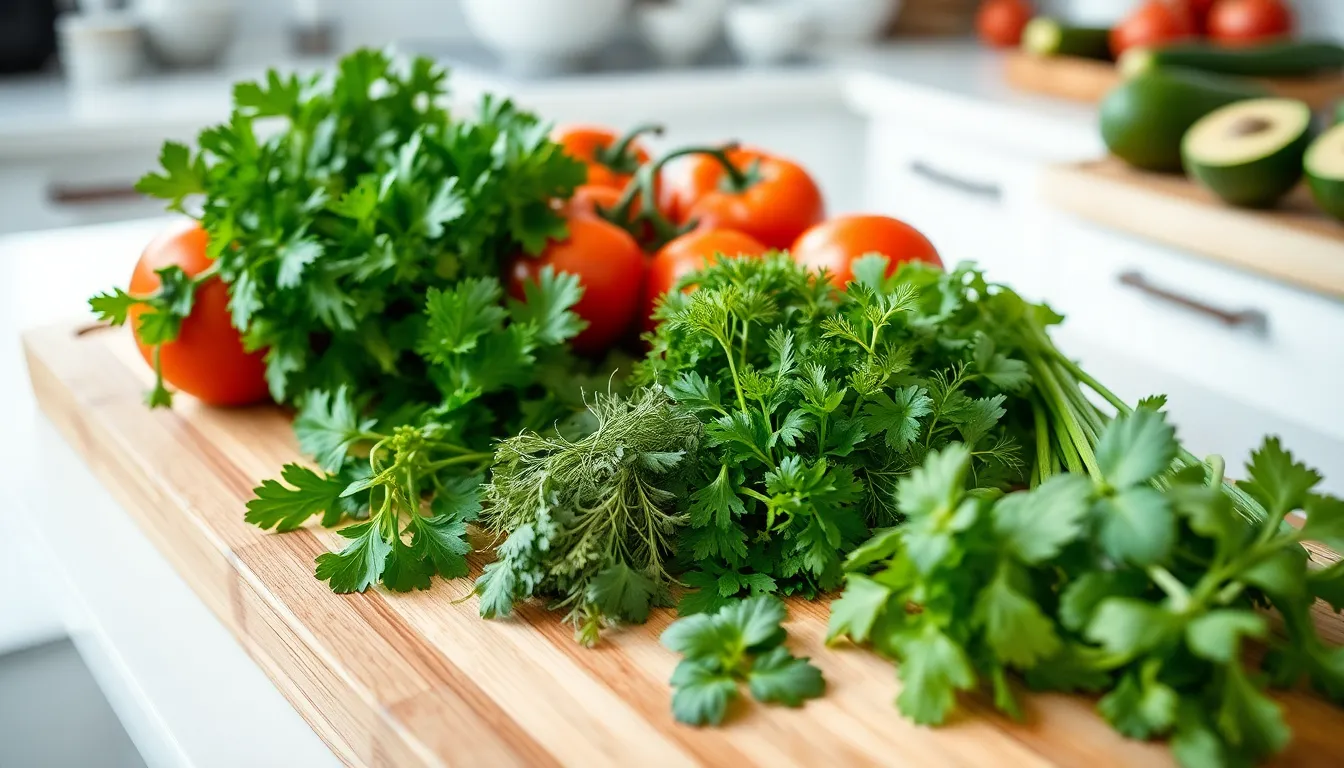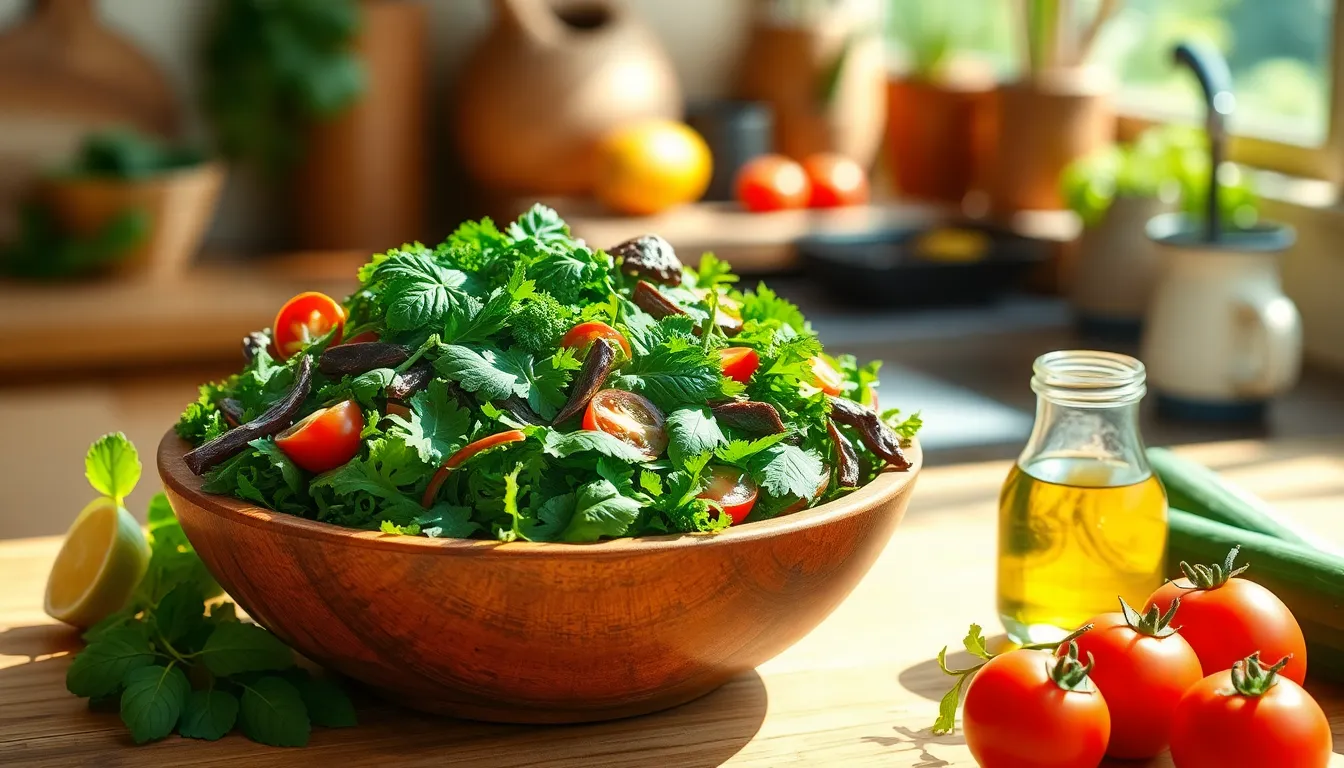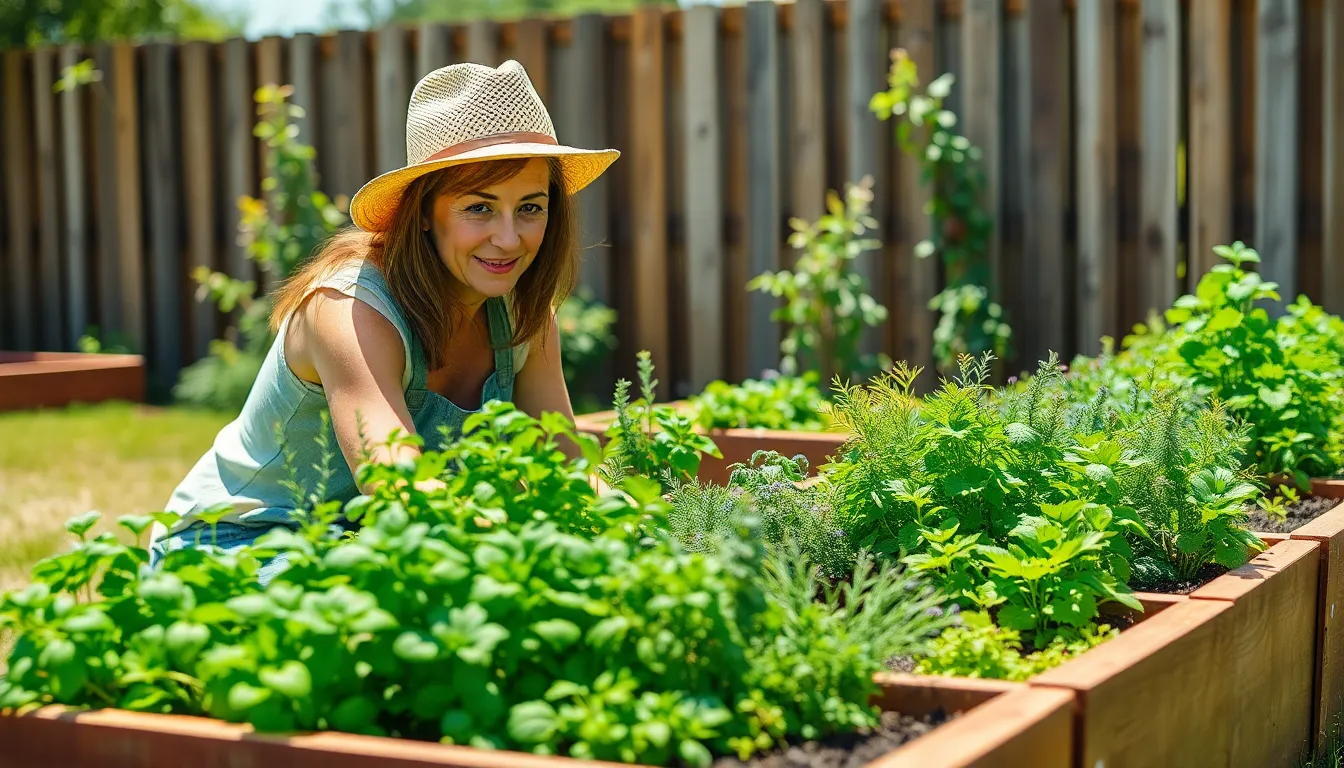Fresh herbs can transform a simple salad into a vibrant culinary experience. They not only add flavor but also bring a burst of color and nutrition. Whether it’s the peppery kick of arugula or the refreshing notes of mint, the right herbs can elevate any dish and make it truly memorable.
Incorporating herbs into salads isn’t just about taste; it’s also about health benefits. Many herbs are packed with vitamins, antioxidants, and essential oils that can boost overall wellness. From basil to cilantro, each herb offers unique flavors and health properties, making salads not just a side dish but a powerhouse of nutrition. Discovering the best herbs for salads can inspire creativity in the kitchen and encourage healthier eating habits.
Table of Contents
ToggleBenefits of Using Herbs for Salads
Using fresh herbs in salads offers numerous benefits. They not only enhance the dish’s flavor and appearance but also boost its nutritional profile.
Nutritional Value
Fresh herbs contain essential vitamins and minerals. For example, basil provides vitamin K, while parsley is rich in vitamin C and iron. Incorporating herbs increases the intake of antioxidants, which help combat oxidative stress and support overall health. Regular consumption of herbs can also provide dietary fiber, aiding digestion and promoting a healthy gut.
Flavor Enhancement
Herbs significantly elevate the taste of salads. For instance, cilantro adds a unique zest, while dill imparts a refreshing contrast. Using a variety of herbs allows for a diverse flavor profile, making each salad a unique culinary experience. Adding herbs like mint or basil can transform a simple salad into a gourmet dish, enticing the palate and encouraging healthier eating habits.
Popular Herbs for Salads

Herbs elevate salads by adding distinct flavors and enhancing nutrient profiles. Several herbs stand out for their culinary versatility and health benefits.
Basil
Basil offers a sweet and aromatic flavor that complements various salad ingredients. Rich in vitamin K, it supports bone health and contains antioxidants that combat oxidative stress. Fresh basil pairs well with tomatoes, mozzarella, and mixed greens, creating a classic Caprese salad.
Parsley
Parsley adds a fresh, slightly peppery taste to salads. High in vitamin C, it boosts the immune system and aids in iron absorption. Use flat-leaf parsley for a more robust flavor or curly parsley for a decorative touch. It enhances salads with grains, beans, or Mediterranean-inspired dishes.
Cilantro
Cilantro provides a unique, citrusy flavor that brightens up any salad. This herb is rich in antioxidants and vitamins A and K, promoting skin health and aiding digestion. Cilantro pairs excellently with avocado, black beans, and lime vinaigrette, making it ideal for Mexican and Asian salads.
Dill
Dill imparts a refreshing, slightly tangy taste, ideal for summer salads. Its high fiber content aids digestion, while its vitamin A supports eye health. Dill works well in potato salads, cucumber salads, and any dish featuring yogurt-based dressings, adding a delightful twist.
Mint
Mint brings a cooling effect to salads, enhancing their overall flavor profile. It’s packed with vitamin A and iron, contributing to overall wellness. Mint pairs beautifully with fruit salads, Greek salads, and tabbouleh, adding a unique, refreshing element that encourages creativity in the kitchen.
Tips for Using Herbs in Salads
Incorporating herbs into salads provides flavor enhancement and nutritional benefits. Understanding the differences between fresh and dried herbs, along with effective pairings, maximizes their potential.
Fresh vs. Dried Herbs
Fresh herbs offer vibrant flavor and aroma, making them ideal for salads. They contain higher levels of vitamins and antioxidants compared to their dried counterparts. Use them in larger quantities; one tablespoon of fresh herbs equates to one teaspoon of dried herbs. Dried herbs, however, provide convenience and longer shelf life. While they may lack some flavor potency, they can still enrich dressings and marinades. Choose herbs based on desired intensity and preparation—fresh herbs for finishing touches and dried herbs for deeper flavor infusion during cooking.
Pairing Herbs with Other Ingredients
Pairing herbs with complementary ingredients creates balanced flavors. Consider the following combinations:
- Basil with tomatoes and mozzarella in Caprese salads.
- Parsley with lemon juice and olive oil for a refreshing vinaigrette.
- Cilantro with avocado and lime for a zesty salad twist.
- Dill with cucumbers and yogurt for a creamy dressing.
- Mint with fruits like watermelon or strawberries for a sweet finish.
Experiment with these pairings to elevate the taste and create visually appealing dishes.
Creative Salad Ideas Featuring Herbs
Herbs bring a burst of flavor and freshness to salads. Here are two creative salad ideas that showcase the vibrant benefits of fresh herbs.
Mediterranean Herb Salad
A Mediterranean herb salad combines basil, parsley, and mint with fresh vegetables. This salad creates a refreshing experience, with tomatoes, cucumbers, bell peppers, and red onions providing a colorful base. Dress this mix with extra-virgin olive oil, lemon juice, and a pinch of salt for a zesty finish. The basil contributes sweet notes while the parsley adds brightness and Vitamin C, and mint delivers a cooling effect. Feta cheese crumbles elevate the flavor further, making this salad perfect for summer gatherings.
Southwestern Herb Salad
A Southwestern herb salad combines cilantro and dill for a bold, flavor-packed dish. This salad features romaine lettuce, black beans, corn, and diced avocados for a hearty base. Incorporate cherry tomatoes and red onion for added crunch and color. A lime vinaigrette made with lime juice, olive oil, and cumin enhances the fresh herbs and ties all the components together. Cilantro brings a refreshing citrus note, while dill introduces an unexpected tang, making this salad both unique and delicious. Add tortilla strips on top for extra texture and a delightful crunch.
Incorporating fresh herbs into salads is a simple yet effective way to boost flavor and nutrition. These vibrant additions not only enhance taste but also provide essential vitamins and antioxidants that support overall health. By experimenting with various herbs like basil, cilantro, and mint, anyone can transform a basic salad into a culinary delight.
The creativity in pairing herbs with complementary ingredients opens up endless possibilities for delicious and nutritious meals. Embracing fresh herbs can lead to healthier eating habits and a more enjoyable dining experience. So next time a salad is on the menu, consider reaching for those fresh herbs to elevate the dish.




